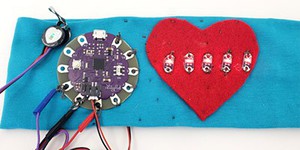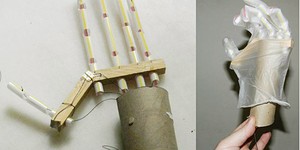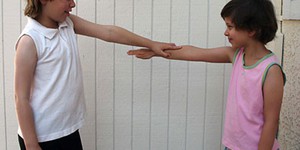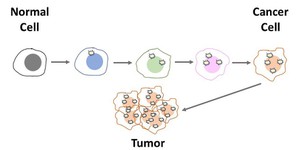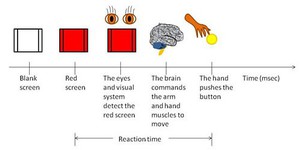Eighth Grade, Human Biology & Health Science Projects (37 results)
Isn't the human body incredible? From the complex systems that make it work to the numerous ways we're able to cure illnesses, there are so many fascinating subjects to study when it comes to human biology and health. Are you interested in subjects like how the body works, how best to keep it working, and how to cure everything from a common cough to cancer?
|
Select a resource
Sort by
|
People have a variety of reasons to use heart rate monitors. For example, patients in a hospital might have stationary, bedside equipment monitor their heart rate and alert medical staff in case of an emergency. Somebody going for a run might wear a portable heart rate monitor to keep track of their workout intensity. Heart rate monitors are not all the same—their appearance and function will vary depending on the intended use. In this project you will design, build, and program your own…
Read more
Featured
Have you heard that garlic powder is supposed to inhibit the growth of bacteria? Which do you think would make a better disinfectant: a solution of garlic powder or a solution of bleach? This project shows you a straightforward way to compare the effectiveness of different disinfectants (or other antimicrobial agents), by measuring zones of inhibition on a culture plate.
Read more
The human body is an impressive piece of machinery, and your hands are no exception. With some training, they can perform delicate and complex tasks like manipulating pens and tools to create art. At the same time, hands have the strength and durability to hold a person's own body weight up on steep rocks. Unfortunately, there is a rapidly growing demand for hand replacements. But fortunately, scientists have studied human anatomy and biology and created human-like hands used as artificial…
Read more
New
Remembering to take medicine at the right time can be hard, especially if you need to take multiple medications at different times of day. It might not be a big deal if you forget to take your daily multivitamin, but for some people, forgetting to take medication at the right time can be dangerous. What if you had a device that could not only set off an alarm at the right time, but also automatically dispense the right pills for you? In this project, you will build an automatic medicine…
Read more
Have you ever watched a great sports player and imitated his or her moves over and over again? Or have you ever felt really bad when someone got hurt or things just weren't going his or her way? If so, you might be surprised to learn that you have been practicing skills closely tied to lying! In this science fair project, you'll discover how your brain gets a workout when it moves from truth-telling to lying, and how you can detect the shift. That's no lie!
Read more
Did you know that some teachers give their students a peppermint candy on state testing days? Is it to give the kids sweet-smelling breath? Or are the teachers hoping for something more on the important testing day? In this human biology science fair project, you'll explore whether or not peppermint influences scores on different types of tests.
Read more
Alzheimer's disease and dementia affect millions of people around the globe. Can you design a "brain training" game that can help people keep their brains healthy as they age, and maybe one day help treat or even prevent diseases like Alzheimer's? Try this coding science project to find out!
Read more
New
Artificial intelligence (AI) programs can now generate photorealistic pictures of people who do not exist in the real world. How can you tell if a picture is of a real person or a fake, AI-generated person? What features of the picture do people use to decide whether the face is real or AI-generated? In this project, you will explore these questions as you ask volunteers to look at both real and AI-generated pictures of human faces.
Read more
You might know that your body needs oxygen to keep going, and that you breathe out carbon dioxide as waste. What happens when you exercise? You have probably noticed that you breathe faster, and your heart beats faster. What triggers your body to respond in this way? How does it "rev up" to keep your muscles going? In this project, you will get a peek into the fascinating science of exercise physiology and find out—with the help of a color changing reaction.
Read more
What is cancer? How does it develop? Doctors and scientists have asked these questions for hundreds of years to understand cancer and find treatments. In this science project, you can investigate these questions too by building a simple model and exploring how environmental and genetic changes affect the development of cancer.
Read more
Yogi Berra said "You can observe a lot by just watching." In this human biology science fair project, you will observe how your eyes perceive color by watching afterimages. Afterimages are the images you see after staring at an object for several seconds and then looking away. You will also learn how different cone cells in your retina respond to different colors.
Read more
There are thousands of bacteria in your gut that help you digest your food, recover important nutrients, and maintain your health. What happens to those bacteria when you take antibiotics? In this science project you will find out by accessing and analyzing a real data set of the gut microbiome (bacteria and other microbes) from healthy adults before and after they are given antibiotics.
Read more
When someone yells, "Think fast!" and throws you a ball, are you able to catch it? When the bell rings at the end of class, are you the first one out of your seat? Can you make it through a sudden hairpin turn in a video game without crashing? If so, then you likely have quick reaction times. In this science fair project, you'll look at reaction times (how fast people react to sensory events), and see if people who play video games have faster reaction times than those who do not.
Read more
|
Explore Our Science Videos
DIY Mini Propeller Car
Junkbots Lesson Plan Introduction
How to Build a Toy Car - Science Project


